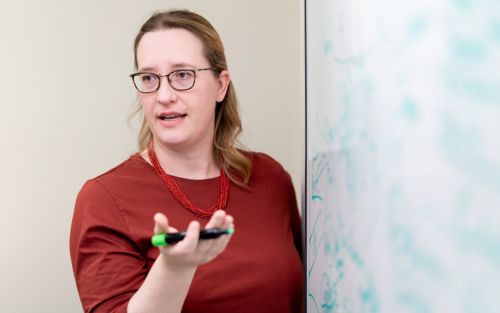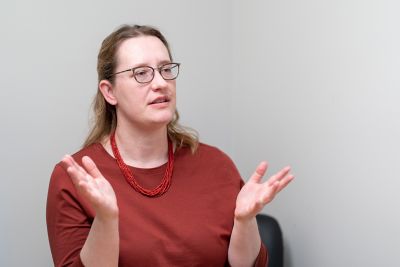St. Jude Family of Websites
Explore our cutting edge research, world-class patient care, career opportunities and more.
St. Jude Children's Research Hospital Home

- Fundraising
St. Jude Family of Websites
Explore our cutting edge research, world-class patient care, career opportunities and more.
St. Jude Children's Research Hospital Home

- Fundraising
Carmen Wilson, PhD
Studying the long-term effects of treatment and the impact of genetics, lifestyle, body composition, and physical fitness on the overall health of survivors of pediatric cancer
Overview
Although cancer treatments have improved over the past several decades, pediatric cancer survivors are still at greater risk for developing long-term health problems. My research centers on the metabolic and endocrine late effects of treatment and examining what impact genetics, lifestyle, body composition, and physical fitness can have on overall health outcomes for survivors of pediatric cancer.

Wilson research summary
As a member of the Department of Epidemiology and Cancer Control, I work in collaboration with my colleagues to study cancer survivorship. To advance our understanding of how cancer treatment impacts long-term health outcomes, we focus on endocrine and cardio-metabolic late effects of cancer treatment and how lifestyle and genetics may contribute to the development of these late effects in adulthood.
One of our main research projects examines the effect of body composition and fat deposition on overall health in childhood cancer survivors. This collaborative study aims to characterize how these two factors affect pediatric leukemia survivors’ risk of developing chronic health conditions such as diabetes, hypertension, and cardiovascular problems. An extension of this study concentrates on patients with solid tumors who received abdominal radiation as part of their treatment. By studying this patient population subset, we hope to determine whether abdominal radiation treatment impacts cancer survivors’ fat deposition and overall health.
Another line of research inquiry explores how DEXA scans—which measure bone density to evaluate strength and body composition—change over time in pediatric cancer survivors. We are interested in understanding whether these changes associate with outcomes such as increased mortality, second cancer risk, and cardiac issues. In a related effort, we evaluate the components of metabolic syndrome and whether risk factors such as genetics and lifestyle impact our survivor population.

In addition to metabolic and endocrine late effects of childhood cancer, we investigate survivors’ physical fitness changes over time to judge whether these fitness levels decline faster than expected. We conduct this work in collaboration with the St Jude LIFE cohort, and our work in this area will help guide interventions to offset early physical fitness declines in childhood cancer survivors.
In all of our cancer survivorship work, we aim to advance our understanding of the long-term effects of disease and treatment to improve overall quality of life for survivors of childhood cancer.
Wilson selected publications
About Carmen Wilson
Dr. Carmen Wilson is an Assistant Member in the Department of Epidemiology and Cancer Control at St. Jude. She received her PhD in Epidemiology from University of New South Wales and most of her professional career has been dedicated to the study of treatment effects in childhood cancer survivors. Outside her research efforts, Wilson offers her expertise as a reviewer for several publications and brings her epidemiology expertise to the SJ Graduate School of Biomedical Sciences as an Adjunct Faculty member.

Contact Carmen Wilson
Carmen Wilson, PhD
Assistant Member
Department of Epidemiology and Cancer Control
MS 735
St. Jude Children's Research Hospital
Memphis, TN, 38105-3678 USA
Follow Us

Memphis, TN, 38105-3678 USA GET DIRECTIONS